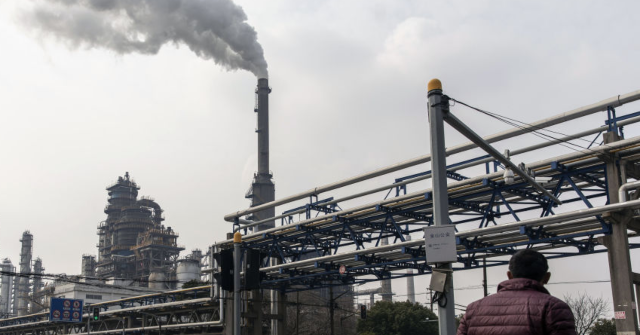Iran’s top customer for oil, China, massively increased its purchases in the first three weeks of June just before Israel began striking Iranian nuclear sites.
According to ship tracking services, China hauled in over 1.8 million barrels per day (bpd) of Iranian oil in the first 20 days of June, a huge increase from the 1 million bpd it was averaging in May. Official Chinese customs reports absurdly insist China has not purchased any oil from Iran since 2022.
The oil surge does not necessarily imply China knew the “12-Day War” was coming, although Beijing would surely have been aware of growing regional tensions and the imminent possibility of the International Atomic Energy Agency (IAEA) censuring Iran for non-compliance. The IAEA censured Iran on June 12, and Israel’s bombing campaign against Iran’s nuclear sites began the following day.
Oil shipments from Iran take about a month to reach China, so June’s imports were probably influenced by projections of rising demand for July and beyond.
The Chinese may also have decided to ramp up their purchases due to general anxiety that shipping through the Persian Gulf and Strait of Hormuz might be interrupted. China obtains a great deal of its oil and gas through Persian Gulf shipping and has lately become worried that its energy supply chain is too vulnerable to regional conflict.
China buys energy products from Iran, Venezuela, and Russia at a steep discount because international sanctions leave each of those countries unable to sell to European customers.
Cheap oil has enabled the growth of independent oil refineries in China, known as “teapot refineries.” These are individually modest operations compared to China’s massive state-owned refineries, but together they comprise about a quarter of China’s oil processing capacity. Most of the teapot operations produce refined fuel oil for vehicles.
Teapot refineries have very tight profit margins, so their business model only works if crude oil prices are low and demand is high. Lately they have been struggling with reduced demand from the slowing Chinese economy, but demand perked up in June, and the teapots were also able to pick up some slack from big state refineries that were undergoing maintenance. The threat of more tariff wars with the United States appears to be holding demand well below normal levels.
In April, the U.S. State Department announced sanctions against a teapot refinery called Shandong Shengxing Chemical Co. for purchasing over a billion dollars’ worth of Iranian crude oil. It was the second U.S. action against a teapot refinery since President Donald Trump returned to the White House.
“As Long as Iran attempts to generate oil revenues to fund its destabilizing activities, the United States will hold both Iran and all its partners in sanctions evasion accountable,” the State Department said.
RBC Capital Markets global energy strategist Brian Leisen told CNBC on Friday that U.S. sanctions have done little to choke off China’s voracious appetite for Iranian fossil fuels.
China and Iran have a sophisticated network of “shadow” tankers that can keep oil flowing from Iranian wells to Chinese teapots, often transferring the oil between ships at sea to make it nearly impossible to trace. China launders its payments in Chinese currency through small banks, protecting China’s big banks from the effect of American sanctions.
“I’ve seen a lot of tankers spoofing their location off Malaysia recently, with these ships taking an additional precaution to hide the ship-to-ship and obfuscate the origin of cargo,” said Lloyd’s List Intelligence risk analyst Bridget Diakun.
A dead giveaway that Malaysian waters have become a preferred route for shadow tanker exchanges is that China currently claims to import about 1.4 million bpd of oil from Malaysia, but Malaysia only produces 0.6 million bpd.
President Trump rattled oil markets with a Truth Social post on Tuesday in which he seemingly gave China the green light to buy as much Iranian oil as it wanted, U.S. sanctions notwithstanding. He had previously threatened sanctions against all countries buying Iranian oil.
“China can now continue to purchase Oil from Iran. Hopefully, they will be purchasing plenty from the U.S., also. It was my Great Honor to make this happen!” Trump wrote.
The White House said Trump’s post should be interpreted not as his blessing for the shadowy China-Iran oil trade, but rather him telling Beijing to show a little gratitude for the United States ensuring the Strait of Hormuz would remain open.
Read the full article here
